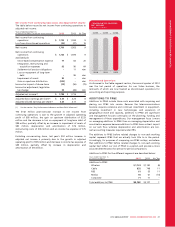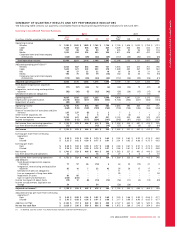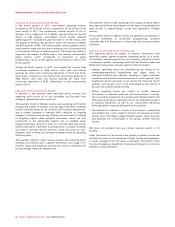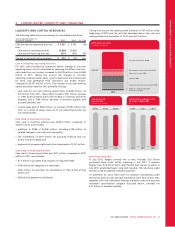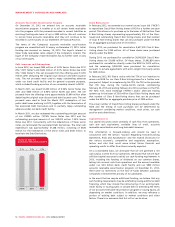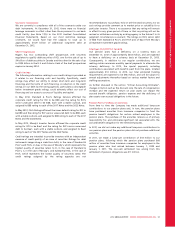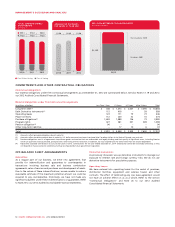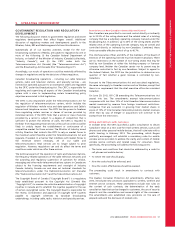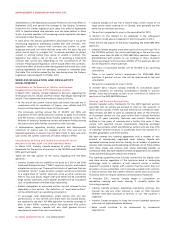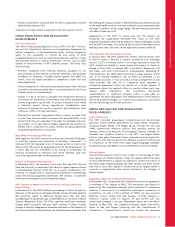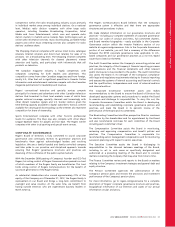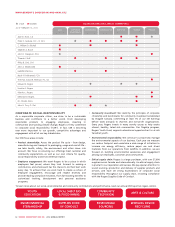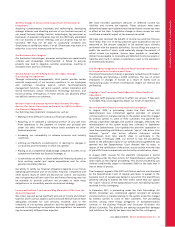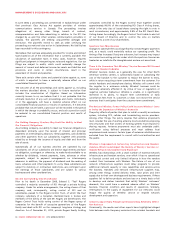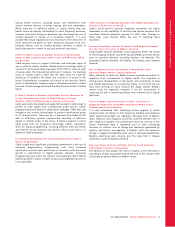Rogers 2012 Annual Report Download - page 61
Download and view the complete annual report
Please find page 61 of the 2012 Rogers annual report below. You can navigate through the pages in the report by either clicking on the pages listed below, or by using the keyword search tool below to find specific information within the annual report.
MANAGEMENT’S DISCUSSION AND ANALYSIS
5. OPERATING ENVIRONMENT
GOVERNMENT REGULATION AND REGULATORY
DEVELOPMENTS
The following discussion relates to government regulation and recent
regulatory developments that affect Rogers overall. Additional
discussion of regulatory matters and developments specific to the
Wireless, Cable, RBS and Media segments follows this discussion.
Substantially all of our business activities, except for the non-
broadcasting operations of Media, are subject to regulation by one or
more of the following: (i) the Canadian Federal Department of
Industry, on behalf of the Minister of Industry (Canada) (collectively,
“Industry Canada”); and (ii) the CRTC under both the
Telecommunications Act (Canada) (the “Telecommunications Act”)
and the Broadcasting Act (Canada) (the “Broadcasting Act”).
Accordingly, our results of operations could be materially affected by
changes in regulations and by the decisions of these regulators.
Canadian broadcasting operations – including our cable television
systems, radio and television stations, and specialty services – are
licenced (or operated pursuant to an exemption order) and regulated
by the CRTC under the Broadcasting Act. The CRTC is responsible for
regulating and supervising all aspects of the Canadian broadcasting
system with a view to implementing certain broadcasting policy
objectives enunciated in that legislation.
The CRTC is also responsible under the Telecommunications Act for
the regulation of telecommunications carriers, which includes the
regulation of Wireless’ mobile voice and data operations and Cable’s
Internet and telephone services. The CRTC has the power to forebear
from regulating certain services or classes of services provided by
individual carriers. If the CRTC finds that a service or class of services
provided by a carrier is subject to a degree of competition that is
sufficient to protect the interests of users, the CRTC is required to
forebear from regulating those services unless such an order would be
likely to unduly impair the establishment or continuance of a
competitive market for those services. The Minister of Industry issued
a Policy Direction that instructs the CRTC to rely on market forces to
the maximum extent feasible under the Telecommunications Act and
regulate, if needed, in a manner that interferes with market forces to
the minimum extent necessary. All of our Cable and
telecommunications retail services are no longer subject to price
regulation. However, regulations can and do affect the terms and
conditions under which we offer these services.
The technical aspects of the operation of radio and television stations,
the frequency-related operations of the cable television networks and
the awarding and regulatory supervision of spectrum for cellular,
messaging and other radio-telecommunications systems in Canada are
subject to the licencing requirements and oversight of Industry
Canada. Industry Canada can and does set technical standards for
telecommunications under the Radiocommunication Act (Canada)
(the “Radiocommunication Act”) and the Telecommunications Act.
The Copyright Board of Canada (“Copyright Board”) is a regulatory
body established pursuant to the Copyright Act (Canada) (the
“Copyright Act”) to oversee the collective administration of copyright
royalties in Canada and to establish the royalties payable for the use
of certain copyrighted works. The Copyright Board is responsible for
the review, consideration and approval of copyright tariff royalties
payable to copyright collectives by Canadian broadcasting
undertakings, including cable, radio, television and specialty services.
Restrictions on Non-Canadian Ownership and Control
Non-Canadians are permitted to own and control directly or indirectly
up to 33.3% of the voting shares and the related votes of a holding
company that has a subsidiary operating company licenced under the
Broadcasting Act. In addition, up to 20% of the voting shares and the
related votes of the operating licencee company may be owned and
controlled directly or indirectly by non-Canadians. Combined, these
limits can enable effective control of up to 46.7%.
The chief executive officer and 80% of the members of the Board of
Directors of the operating licencee must be resident Canadians. There
are no restrictions on the number of non-voting shares that may be
held by non-Canadians at either the holding-company or licencee-
company level. Neither the Canadian carrier nor its parent may be
otherwise controlled in fact by non-Canadians. Subject to appeal to
the federal Cabinet, the CRTC has the jurisdiction to determine as a
question of fact whether a given licencee is controlled by non-
Canadians.
Pursuant to the Telecommunications Act and associated regulations,
the same rules apply to Canadian carriers such as Wireless, except that
there is no requirement that the chief executive officer be a resident
Canadian.
On June 29, 2012, Bill C-38 amending the Telecommunications Act
passed into law. The amendments exempt telecommunications
companies with less than 10% of total Canadian telecommunications
market measured by revenue from foreign investment restrictions.
Companies that are successful in growing their market shares in
excess of 10% of total Canadian telecommunications market revenues
other than by way of merger or acquisitions will continue to be
exempt from the restrictions.
Billing and Contracts with Customers
In October 2012, the CRTC launched a public consultation to obtain
Canadians’ views on a new code for retail wireless services, such as cell
phones and other personal mobile devices, that will culminate with a
public hearing in February 2013. The proceeding, which Rogers
publically encouraged, will establish a mandatory code for mobile
wireless service providers to address the clarity and content of mobile
wireless service contracts and related issues for consumers. More
specifically, the proceeding will address the following points:
• The terms and conditions that should be addressed by a code for
cell phones and mobile devices;
• To whom the code should apply;
• How the code should be enforced; and
• How the code’s effectiveness should be assessed.
The proceeding could result in amendments to contracts with
customers.
The Quebec Consumer Protection Act amendments, effective June
2010, introduced new provisions applicable to wireless, wireline and
Internet service contracts. These amendments include new rules on
the content of such contracts, the determination of the early
cancellation fees that can be charged to customers, the use of security
deposits and the cancellation and renewal rights of the consumers.
The amendments also established new provisions on the sale of
prepaid cards and the disclosure of related costs.
2012 ANNUAL REPORT ROGERS COMMUNICATIONS INC. 57


